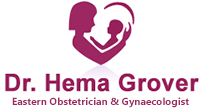Pre-Conception Testing
Pre-pregnancy Health Assessment
During a pre-pregnancy health assessment, your doctor reviews your medical history, reproductive history, diet, lifestyle and other habits, and performs a thorough physical examination. Your physician may order certain blood tests (full blood parameters, iron and ferritin levels) and urine tests (for sugar, protein and infection) to check your health condition. During your pre-pregnancy health assessment, the following will be assessed:
- Medical conditions: A thorough medical examination before pregnancy helps in diagnosing any medical condition, such as diabetes, high blood pressure, anaemia, kidney disorders, thyroid diseases and heart problems, which may affect you and your baby. Your physician will advise you on certain measures to control them.
- Infections and vaccinations: During pregnancy, you will be more susceptible to infections, which can sometimes cause serious birth defects or illnesses in your baby. You may be tested for various infections such as measles and chicken pox and advised vaccination before pregnancy.
- Immunisation: You will be tested for hepatitis-B virus. If you are a carrier, blood tests will be performed to identify the virus so that your child can be vaccinated at birth.
- Hereditary disorders: In women with a family history of hereditary disorders such as haemophilia, sickle cell anaemia, cystic fibrosis and thalassemia, the chances of a child developing these conditions is high. Therefore, before planning for pregnancy your doctor may suggest that you and your partner undergo certain tests to identify these diseases. This is usually followed by genetic counselling.
Pre-pregnancy Counselling and Planning
Pre-pregnancy counselling is a counselling session conducted before you conceive. It is beneficial for you as well as your baby during the term of pregnancy. It helps in checking for possible risk factors during pregnancy and resolves any medical issues you may have before you become pregnant. Pre-pregnancy counselling and planning will help you to become physically healthy and emotionally strong before you enter the phase of pregnancy.
What happens during a pre-pregnancy counselling session?
You can discuss and clarify with your doctor all the things that concern you before you get pregnant, like starting prenatal vitamins, diet or any hereditary health issues. Many important points will be discussed during your pre-pregnancy counselling session. They include:
- Reproductive history: Your doctor will discuss your menstrual history, use of contraceptives, any previous sexually transmitted diseases, vaginal infections and Pap test results.
- Medical and surgical history: You should inform the doctor about any past health problems so that theycan be controlled while you plan your pregnancy. Any past surgeries or hospitalisations should also be brought to the doctor's notice.
- Current medications: Discuss with your doctor regarding any prescription, over-the-counter medications or herbal supplements that you may be currently taking. This can help the doctor plan your medications to prevent any potential problems during your pregnancy.
- Weight: It is always better to have an ideal weight before you conceive. Gaining weight if you are underweight will reduce the risk of having a low birth-weight baby, and reducing weight if you are overweight will prevent the risk of high blood pressure during pregnancy.
- Workplace and home environment: Your doctor will discuss potential hazards to conception or maintaining a pregnancy, such as exposure to lead or certain toxic solvents, radiation and cat faeces.
- Lifestyle: The effect of certain habits like alcohol consumption, smoking and use of recreational drugs on pregnancy will be discussed. You and/or your partner may be advised to stop these habits for a healthy pregnancy.
- Exercise: Inform your doctor about the type of exercises you perform or if you don't exercise. Based on this, you may be advised to continue normal exercises during pregnancy until your doctor suggests otherwise.
- Diet: Having good dietary habits is beneficial during pregnancy. You will be advised to consume food rich in folic acid, calcium, fibre and other nutrients, and reduce the intake of caffeine, which is present in coffee, chocolates, soft drinks and medications, before getting pregnant.
- Family health history: Inform your doctor about the presence of hereditary medical conditions and multiple births in the family.
- Prenatal vitamins: You should start taking folic acid supplements before you conceive, as folic acid reduces the chances of neural tube defects in your baby.
Your doctor may also recommend:
- Physical examination of your abdomen, heart, breasts, thyroid and lungs
- Pap smear and pelvic examination
- Lab tests to screen for hepatitis, HIV, rubella, syphilis and other conditions
- Charting menstrual cycles to monitor ovulation and determine the most favourable time to get pregnant
- Appropriate vaccinations against rubella or chickenpox, and recommend delay in conception for a month
- Genetic counselling for older mothers or those with a risk of hereditary diseases to help you understand the chances of birth defects or intellectual disability in the child.




